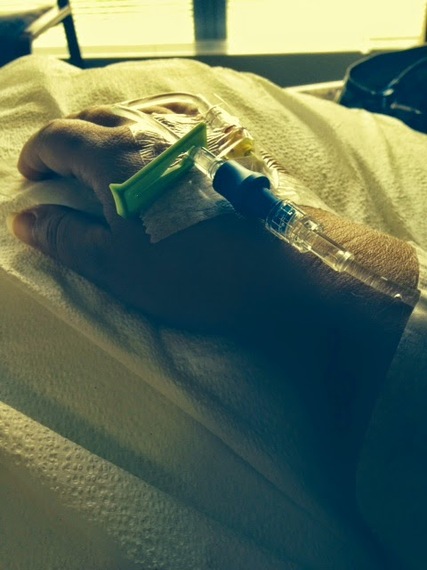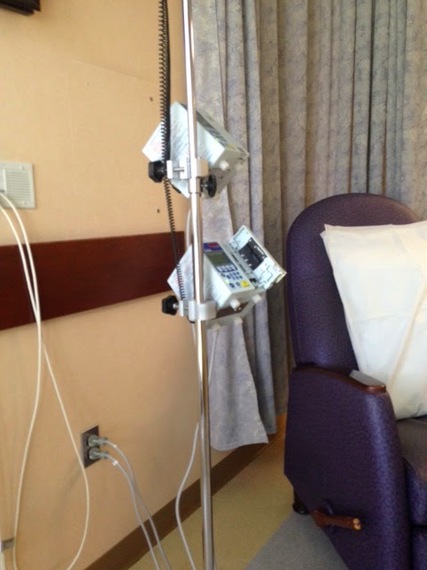I was sick.
Not the kind of sick that kills you or the kind of sick that can't be treated. But rather the slow, insidious sort of sick that makes living each day just a little bit harder, a little more exhausting. An unimpressive and lonely sick, one I didn't feel like explaining the validity of to anyone that didn't specifically ask. And even then, I'd say, "I have anemia, it's pretty bad, but we have a plan to fix it, so it will be fine."
Except, I mostly didn't think I was fine.
When I walked up to my bedroom, I had to stop and breathe on the top stair, there were stars spinning and a black sky in my frontal lobe. I was dizzy and my skin was pale.
I stood in front of the open freezer door, a butter knife in my hand, carving off ice chips from a frozen block and crunching them between my teeth. It's pica, the doctor said. Be glad you're not craving dirt. But if it had been dirt I was craving, I would have scooped it by the handfuls into my mouth.
What the body thinks it needs, the body gets. It's powerful business.
More than anything, though, I was tired all the time. A friend might say, "I'm exhausted!" and I might nod sympathetically, but inside I was thinking, what a careless thing to say, and she doesn't know how exhausted REALLY feels.
And this made me bitter, the space between her not understanding and my own hardening self-pity.
I shut people out, I closed the doors on friends. They couldn't know.
And so, the bad days grew more frequent. And the more I felt sorry for myself, the smaller my world became.
When the hematologist advised IV iron transfusions, my world had condensed to the size of an infusion room: four walls, two chairs (one of them empty) a television that never came on, an IV pole with a scary computer attached. I went alone to the first infusion, barely telling anyone but my husband and a few close friends. I hated needles, I had passed out at the lab the week before. I was less than bitter but more than indifferent, I was consumed by myself and my own worry, hungry for some relief. Walking into the Infusion Center, it felt like an annoying dream, another bad day in a string of bad days.
So I hunched in the small, pink room, with a shot of iron doled out in a black tarry dose. That liquid gold dispatched into my veins, to make me strong again, to help me crawl out of the tiny space that I had settled into, hoping it would work for me. The nurse had left the door to the small room open just a crack. And while I hunched, I listened to the noises and conversations that drifted all around me, in the other infusion rooms and the sterile hall.
Almost everyone was there for chemotherapy, I saw them as I walked down the hall coming in. Bald heads and thin arms. The walls, covered with notices for Cancer Support Groups and Arranging Hospice seminars.
And yet, unlike mine, the voices around me were still cheerful. Or if they were not cheerful, they were the voices of people doing the business of living. Briskly communicative, functional and pleasant.
I heard lots of people laughing. Sick people, mind you. Sicker than me. They were discussing dinner plans. Doing work, writing thank-you notes. I was surrounded by people, with thin hands empty but not outstretched, who were being spoon-fed medicine gratefully. Hopefully. People who were using all their strength, trying not to die, but were still doing heavy work -- the work of trying to be whole and trying to be happy.
I was not going to die. But I had lost myself in the small space, I was sorry for myself. I wanted a long string of better days.
Most of the other people there just wanted more days. Just... days.
Next to me, there was a woman in her 40s, wearing a scarf on her head. I had noticed her when I came in and now her voice was slipping in through the open door to my room. She was talking with the nurse about her job as a librarian, about the husband who has to sleep with books in the bed. She was telling jokes -- the scarfed woman's friend, who was with her, was laughing, the nurse was laughing.
When the nurse came to check on my IV, I nodded my head toward the room next door.
"They sound funny." I said. I was being nosy. I didn't even care.
"Yes. Chemotherapy. She always has someone different with her! I mentioned once that she had so many great friends to come to her infusions. But the woman that was with her interrupted me. 'She is the great friend, we are just returning the favor.' That woman is hysterically funny. I love her. It makes you realize..." The nurse's voice trailed off.
Yes, it makes you realize.
That your bad days are someone else's better days.
That your world is as small as you want to be.
That you never know when you are finished living, so you may as well live right up to the edge of it.
***
I was sitting in the pink room at the infusion center again, two days later. The door was open wide this time, the hall was quieter, but still pleasant. The librarian was not in the next room. She was home, hopefully, I imagined her propped up on pillows in bed, reading her stack of books and killing cancer cells. It was an elderly man, instead, next door, sleeping in the recliner.
But the nurse was the same and she started my IV, gave me the iron. Told me I had an hour to wait.
"Can I get you a magazine? Something to keep you company while you wait?" She asked as she stood to leave the tiny little room, the small space of it resembling, dangerously, the depth of the world I had been living and isolating myself in.
"No, my husband is coming this time." I told her.
And he peeked into the little room, just then, smiling with his eyes just for me.
We sat together in comfortable silence, listening to the IV monitor ticking off the time. The room was still small, even though we left the door open wide. But it grew bigger the minute he stepped inside.
All the while, up and down the hall, there were other monitors ticking, IV's dripping.
Everywhere, I heard the sound of days being lived. Bad days. Last days.
But the loudest sounds on that hall were the better days. The better days were the days that someone sat beside you and held your hand. The better days were the ones where you could see particles floating in the sunlit air of your hospital room. And hear the big, whole laugh of a woman who loved books and was beating cancer. Or the loud, vibrating snores of a man who was sleeping his pain away.
Those were the days, I realized, that reminded you that there was something still waiting for you.
That there were better days for you, too. If you listened carefully, mindfully.
And if you kept the door open wide enough to let them in.

